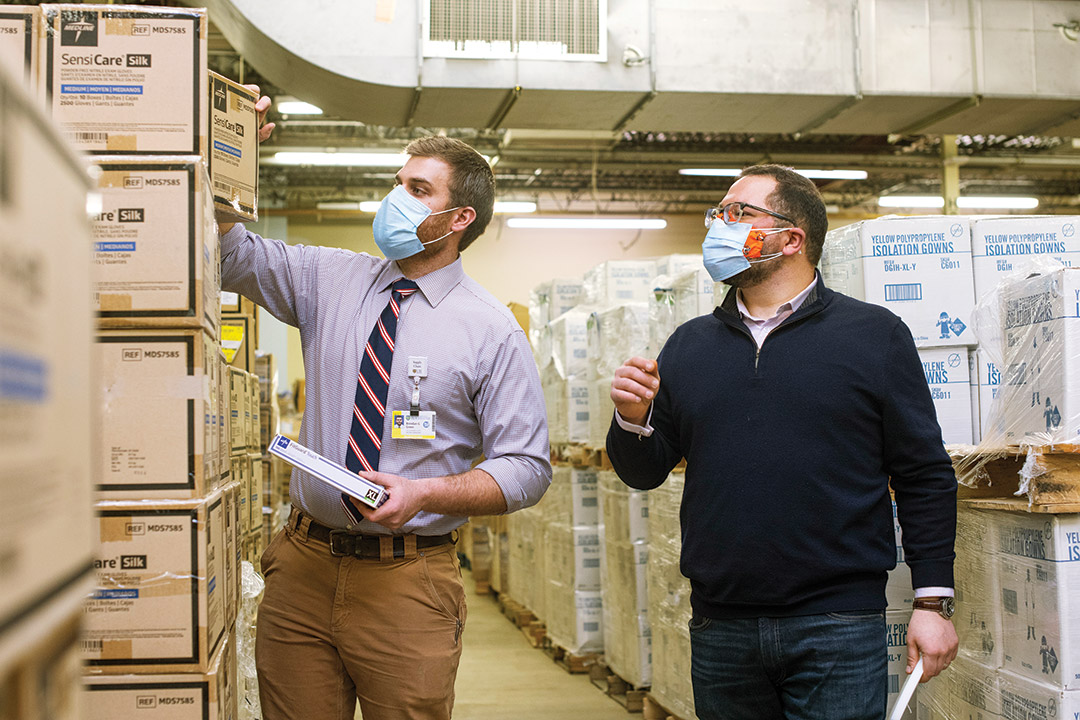Students learn supply chain management by solving real-world problems
A. Sue Weisler
RIT student Brendan Green, left, and Assistant Professor Steven Carnovale discuss the supply chain management of PPE at University of Rochester Medical Center. As part of his RIT class, Green is using real-world supply chain issues to find workable solutions.
The impact of COVID-19 on national and global supply chains has dominated discussions in boardrooms and at dinner tables since the beginning of the pandemic. From meat and toilet paper shortages in grocery stores, to significant lapses in life-saving personal protective equipment in hospitals and clinics, the world has witnessed how supply-chain disruptions halt progress.
But while this unprecedented global health crisis has created many challenges, it has also presented RIT faculty, and students like Brendan Green, with opportunities to apply theoretical supply-chain scenarios to solve real-world problems.
For several months, Green, a graduate student in RIT’s global supply chain management program, has been a supply chain specialist for University of Rochester Medical Center (URMC), managing order placement, shipping, and receiving. He is also part of the effort to streamline PPE ordering from URMC’s affiliates, including hospitals and urgent care facilities, with a new web application.
As part of his work, Green keeps current with ever-changing guidelines, regulations, and supply-chain constraints, and ensures that URMC clinics and hospital locations have PPE in the right place, at the right time, and for the right price.
“Through my combined classroom and work experiences, I’ve learned that hospitals have been under pressure to manage purchasing, inventory, and distribution of big commodity items like gloves, masks, and gowns,” said Green, who is from Penfield, N.Y. “This project is developing the platform that will deal with the outside pressures in this market.”
Assistant Professor Steven Carnovale leads RIT’s graduate supply chain degree offerings and teaches the undergraduate supply chain management capstone course, which is part of the undergraduate supply chain degree program, a future-focused new economy major.
Together with his colleagues, Carnovale has tweaked the curriculum to reflect how to coordinate the balance of inbound and outbound materials, how manufacturers have had to move facility operations to domestically based operations, and how companies are reconsidering sourcing decisions in the midst of COVID-19.
In fact, RIT’s supply chain graduate program was recently revised as STEM-designated degrees using 21st-century data-driven techniques and decision making to generate practical, managerial results.
“At the point when COVID-19 became a global phenomenon, I was able to relay to our classes how supply chain is the epicenter when it comes to sourcing, manufacturing, and distribution. Everything is interrelated,” said Carnovale, who teaches Green’s Supply Chain Analytics course. “COVID-19 has induced a bull-whip effect where manufacturing decisions, the demand for supply, and disorganization have resulted in one of the most common problems in supply chain management—a failure to fulfill orders on time, and in full.”
Carnovale also said that although Green’s real-world example uses PPE as the “goods,” mathematical modeling and analytical techniques allow students to substitute PPE for books, shirts, eggs, milk, or any product that a supply chain is tasked with fulfilling.
“We don’t teach sophisticated random guessing. When our students and graduates speak with their managers, they won’t say, ‘I think we can probably save the company $10,000. Instead, they will be able to say, ‘If we do this, this, and this, we will save this much. And here’s the proof.’”
Green is also learning to roll with the supply-chain punches and respond in ways that will create solutions. “You think you’re shored up with a supplier, but they call with a logistics issue. You have to go back to the drawing board. Then the government comes up with new guidelines. I’m learning how to handle a constantly shifting environment.”
Prior to URMC, Green had worked for a local small business and always enjoyed the operational side of the business. His fascination with how goods flow from company to company and move throughout the world fueled his passion for supply chain.
“This has been a very challenging time for everyone, including URMC, but it has also been a great learning experience at work and in the classroom,” said Green. “I just love seeing this process go from zero to where we need it to be. From inventory to logistics to distribution, I love being in touch with so many areas of supply chain management. It’s a wonder to me.”
As for Carnovale, he believes in the power of real-world corporate learning.
“This is a program where the rubber meets the road. We are giving our students a toolbox equipped with multiple ways to solve the problems that they will inevitably face. We teach them how to be the ‘Ace Hardware’ of supply chain.”













